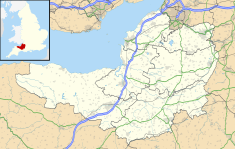West Pennard Court Barn (which is also known as the Court Barn, West Bradley) is a late 14th or early 15th century tithe barn which was built for Glastonbury Abbey. The Grade I listed building is between West Pennard and West Bradley in the English county of Somerset.[1]
| Court Barn | |
|---|---|
 | |
| Location | West Bradley, Somerset, England |
| Coordinates | 51°07′51″N 2°38′56″W / 51.13083°N 2.64889°W |
| Built | 15th century |
Listed Building – Grade I | |
| Official name | Court Barn, West Bradley |
| Designated | 2 June 1961[1] |
| Reference no. | 1175792 |
The barn was restored by the Society for the Protection of Ancient Buildings in the 1930s following the collapse of the roof and then given to the National Trust. At 50 feet (15 m) long and 20 feet 6 inches (6.25 m) wide it is the smallest of the barns associated with the abbey. It has a cruck braced timber framed roof and is supported by two-stage buttresses.
History
editThe barn which was originally known as Parson's Barn,[2] was built on the orders of the Abbot of Glastonbury Abbey in the late 14th or early 15th century. There is no written record of the exact date and there is some debate about the likely age of the building based on the architectural features.[3][4] Along with several others barns it was used to collect the tithes or dues to the abbey, often one tenth of a farm's produce. It fell within the hundred of Glaston Twelve Hides which was named after the hides who gave food rent to Glastonbury Abbey.[5] The West Pennart Court Barn is the smallest of those which survive.[6]
A survey in 1932 found that the roof was cracked and it eventually collapsed in 1935. In 1936 the roof structure was straightened, preserving the medieval trusses where possible, and covered with clay tiles.[7] The restoration was undertaken by the Society for the Protection of Ancient Buildings,[8] with the work being funded by Roger Clark of the local shoemakers C. & J. Clark[3] who bought the derelict barn for £5.[9] It has been owned by the National Trust since 1938.[3] Designation as a Grade I listed building first took place in 1961.[1][10] A survey in 2002 found minor repairs were needed to the doors and wall plate.[7]
Architecture
editThe rectangular five-bay barn is 50 feet (15 m) long and 20 feet 6 inches (6.25 m) wide, although it was previously larger.[1][11] The middle bay is slightly longer than the others because of the central porches.[4] The barn is built of local Blue Lias stone with some better quality oolitic ashlar used for the quoins on the corners and the porches which provided cover for goods being loaded and unloaded at the doors.[4] It is supported by two-stage buttresses reaching to three quarters of the height of the walls.[1] Each of the side walls has ventilation slits, or breathers, with those in the end walls being in the shape of a croix pommée.[6][10] The barn originally had an attached dovecote on the western end,[6][12] and still has niches for birds inside the barn and on the east gable wall.[1] The dovecote was adapted into a calf shed.[3]
The roof was originally thatched but now is tiled, and is supported by cruck bracing to the timber frame of six principal trusses.[1][3][6] The design of the roof is similar to that in the other tithe barns of Glastonbury Abbey at Pilton, Manor Farm, Doulting and Glastonbury itself, which is now part of the Somerset Rural Life Museum.[6] The carriage porch where wagons would have been unloaded is covered by the sloping roof.[13]
See also
editReferences
edit- ^ a b c d e f g Historic England. "Court Barn (1175792)". National Heritage List for England. Retrieved 5 April 2015.
- ^ R. W. Dunning (editor), M. C. Siraut, A. T. Thacker, Elizabeth Williamson (2006). "Parishes: West Bradley". A History of the County of Somerset: Volume 9: Glastonbury and Street. Institute of Historical Research. Retrieved 15 December 2013.
{{cite web}}:|author=has generic name (help)CS1 maint: multiple names: authors list (link) - ^ a b c d e "West Pennard Court Barn". National Trust. Archived from the original on 15 December 2013. Retrieved 15 December 2013.
- ^ a b c "Court Barn and dovecot, West Bradley". Somerset Historic Environment Record. Somerset County Council. Retrieved 24 May 2015.
- ^ Radford, Courtenay Arthur Ralegh; Abrams, Lesley; Carley, James P. (1991). The Archaeology and History of Glastonbury Abbey: Essays in Honour of the Ninetieth Birthday of C. A. Ralegh Radford. Boydell & Brewer Ltd. p. 63. ISBN 9780851152844.
- ^ a b c d e Radford, Courtenay Arthur Ralegh; Abrams, Lesley; Carley, James P. (1991). The Archaeology and History of Glastonbury Abbey: Essays in Honour of the ninetieth birthday of C.A.Ralegh Radford. Boydell Press. pp. 79–87. ISBN 978-0851152844.
- ^ a b Garner, Keith. "West Pennard Barn". Keith Garner Architects. Retrieved 18 May 2015.
- ^ "West Pennard Court Barn". Britain Express. Retrieved 15 December 2013.
- ^ Lovell, Percy (1970). Quaker inheritance, 1871-1961: a portrait of Roger Clark of Street based on his own writings and correspondence. Bannisdale Press. p. 224.
- ^ a b "Court Barn, Scott's Lane (East side), West Bradley". Somerset Historic Environment Record. Somerset County Council. Retrieved 24 May 2015.
- ^ May, F. (1980). Proceedings, Volumes 123-124. Somersetshire Archaeological and Natural History Society. p. 32.
- ^ Pevsner, Nikolaus (1958). South and West Somerset. Penguin Books. p. 336.
- ^ "Court Barn, West Bradley". Ken's Great Barns. Retrieved 24 May 2015.
